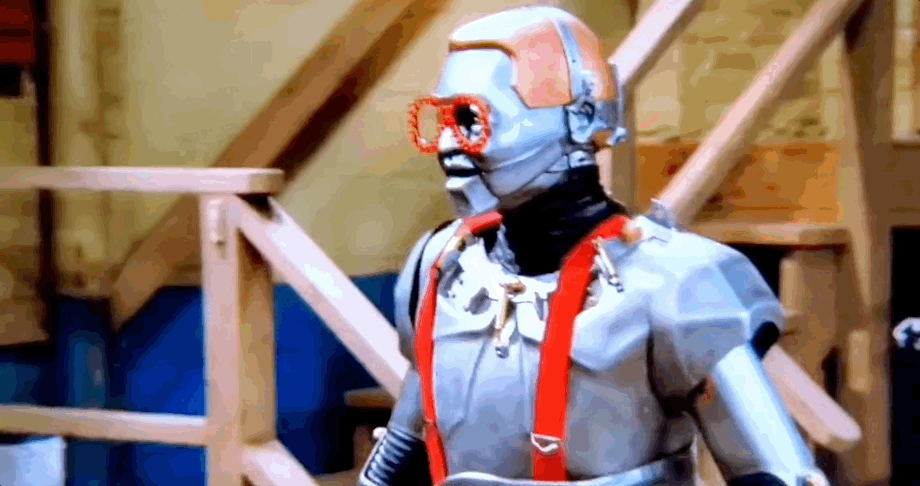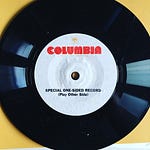Over two weeks in late summer 1944, 33 people in Mattoon, Illinois, reported waking up in the night to an odd smell in their homes. They felt sick. Some said they couldn’t move. Others said they saw a strange figure outside. Reports spread that someone was pumping toxic gas into houses.
It’s unlikely The Mad Gasser of Mattoon was real. The case is cited as an incident of mass hysteria, possibly influenced by air pollution.
I grew up about an hour and a half from Mattoon and I heard this story a lot as a kid. Every time, it made me think of the sitcom Family Matters. In one episode, a pair of thieves pipe sleeping gas through the mail slot of the Winslow home in Chicago so they can subdue patriarch (and police officer) Carl and rob the house.
In adulthood, I’ve wondered if this was a real episode or something I remember but can’t find proof of, and may have made up. A few weeks ago, I looked for confirmation on a Family Matters wiki and was reminded of how strange the show became as episodes focused less on the Winslow family and more on breakout star Steve Urkel.1 In the show’s third season, Steve builds a robot that develops human emotions. Later, he programs the robot to fight crime. In the fifth season, Steve uses genetic engineering to create “Cool Juice,” a potion that turns him into his suave alter-ego Stefan Urquelle. Later, he builds a transformation booth to turn himself into Stefan. In the seventh season, Steve clones himself and turns his clone into Stefan, who then moves to Paris to work as a model.
Clones, crime-fighting robots, Cool Juice. These are real plots points in a mainstream, popular comedy show.
Scanning through my streaming apps for something to watch this weekend, I passed by plenty of great shows, but there was nothing like this. Nothing that employed fantasy for fun’s sake or that embraced silliness first and foremost to entertain. All of my options were heady, heavy, or rooted in realism. Weirdness has gone by the wayside.
I asked a group text if they could imagine any sitcom today adding a storyline about a machine that makes people cool and a friend pointed me to a New Yorker profile of Simpsons writer George Meyer from 2000. A few years after Stefan Urquelle’s swan song, Meyer summed up contemporary TV comedy as “a bunch of people who hang around in some generic urban setting having conversations and sniping at each other.”
Meyer grew up in the ‘60s, when mainstream TV sitcoms were very strange. There were two shows about suburban housewives with magic powers (Bewitched and I Dream of Jeannie), two shows about families of monsters (The Addams Family and The Munsters), a show set in a German POW camp (Hogan’s Heroes), as well as shows about a talking horse (Mr. Ed), a space alien (My Favorite Martian), and a flying nun (The Flying Nun). Not every show had a zany premise, and not every zany show was good, but the scope of what a TV comedy could be about was extremely wide.
As the sitcom format matured, the subject matter narrowed. There might be an occasional show about a space alien living with humans (Mork & Mindy and Alf), but shows increasingly focused on coworkers or families without any extraterrestrial, cybernetic, or superhuman interference.2 When the multi-camera sitcom faded away, shows became even more realistic. Several were framed as documentaries (The Office, Parks and Recreation, Modern Family, Abbott Elementary).
This can lead to good shows (Abbott Elementary is a standout this season). But the well for ideas is bound to run dry. Sitcoms, even at their zaniest, have always been driven by stock character types. TV is packed with wacky dads (be they Tim Taylor or Herman Munster), wisecracking friends, annoying neighbors, and hapless bosses. Now the possible places for these personas to populate is limited to the real world, and to settings within the real world that haven’t been used already. At the same time, networks seem to be pouring cement down the well, anxious to pave it over. There aren’t many sitcoms on TV at all anymore. They’ve been replaced by crime procedurals, reality TV, and attempts at prestige.
If a show ventures from realism, it lands on a larger purpose than laughs, or it leaves the sitcom format entirely. The Good Place was one of the most surreal sitcoms of the last decade, but its setting in the afterlife was a way for the writers to explore ideas about ethics and morality. Atlanta and Bojack Horseman are both great shows with funny jokes and surreal elements, but neither is a sitcom or even strictly a comedy. Besides, Bojack Horseman is animated. Riverdale can be surprising in its strangeness, but it’s a drama based on comic books. It’s great to have so many thoughtful, artistic, sophisticated, and occasionally challenging shows—I enjoyed all the ones in this paragraph. Watching them, though, I crave a balance. Every great meal deserves dessert.
I get the sense that this is the only way networks allow shows to be strange. High concept, low-stakes, dumb fun doesn’t have a place on TV at the moment. Silliness is consistently packaged with seriousness.
In an essay on the disappearance of “trash” culture, Wesley Morris writes that we’re in an era when “the gutters are getting a power wash.” Surreal silliness is being cleared away with the trash, too. The only shows that stay have a heady anchor attached. “In the past 20 years, our pop art has lost some crucial pleasure node,” Morris writes. “It has popped less often, less brightly. The trash urge is now the superhero urge, and the crusades don’t necessarily entail a cape. They’re moral.”
Outside of comedy, concepts have never been higher in mainstream entertainment. The hottest shows going now are a Game of Thrones prequel and a Star Wars spinoff. The most popular entertainment in the world is about people with impossible technology and magic powers, but somehow it’s been nearly 30 years since anyone in a television sitcom built a robot that could be mistaken for a real person or a machine that could make nerds cool.
In the New Yorker, Meyer theorizes that live studio audiences drove the change in comedy. When shows were filmed in front of a crowd, lines that didn’t get a laugh were cut, and writers pushed to make their jokes as big and obvious as possible. Very few shows are made like this now, but the internet has provided an active and responsive audience that tells studios exactly what they think of every scene. And studios respond by giving that audience the path of least resistance to entertainment of all sorts, not just comedy.
But maybe they’re misreading. Look closely, and there’s plenty of evidence now that viewers want zany plots. They want them so bad that they’ve built their own reality to make them happen.
While trying to find out if there was ever an episode of The Big Bang Theory where two characters swapped personalities after attempting to test a mind-reading machine (there wasn’t), I came across a ScreenRant post about a fan theory that one of the show’s characters was secretly a robot built by another character. What’s more, this theory, the article says, ”isn't the first time a The Big Bang Theory character is posited to be a robot.” The fans are so desperate for surrealism they will see it where it doesn’t exist. They see it so clearly they argue with other people about it. Unfortunately, as the post explains, ”the show's storylines were usually rooted in science; in fact, they even had real-world physicist consultants to make their narratives as realistic as possible.”
This drive for accuracy is in service of another type of devoted fan—the one who doesn't invent theories, but instead fantasizes about nits they can pick. YouTube is filled with videos that conflate pointing out imagined plot holes with actual criticism. The videos lay out “everything wrong with” a movie or show, then point to perceived continuity errors or gripe about plot mechanics that aren’t completely explained on-camera. It’s a type of engagement that demands every story to be coldly logical and asks that every character state their emotions and motivation clearly. It’s an engagement that has managed to make space operas and shows about dragons fighting each other boring and predictable.3 It’s what leads to a sitcom hiring consultants to “make their narratives as realistic as possible.”
The type of fan who demands realism in fantasy will never be pleased, yet they are catered to. The other type of fan, the type who concocts theories to inject fantasy into the realism they’re given, wants to be pleased and is being ignored.
Old surreal sitcoms weren’t better than what we have now, but there were paints on the palette that have gone unused for a long time. The ever-present realism—even the version that’s enforced in superhero movies and fantasy—serves to preemptively silence the critical voices among viewers. But other viewers see something lacking, and they invent it. They pretend a character on The Big Bang Theory is a robot when no one would dare put a robot in a sitcom today.
When there’s not silliness, people show that they crave it. When something isn’t there, the mind fills in the gaps.
Either that, or the viewer goes back to something that gives them what they want. Family Matters has been a hit in recent years on streaming platforms.
One major step in this shift in sitcoms was an event that’s now called “The Rural Purge.” CBS leadership canceled all of its cornpone shows in a single day to make room for The Mary Tyler Moore Show, All in the Family, and other sitcoms that tackled more serious subject matter. I wrote about this in a previous article for The Bitter Southerner.
I find it hard to make any assumptions about a superhero’s motivations. Leaving aside Joseph Campbell-style analysis of myth and the idea of heroes, if I were an indestructible being from another world with amazing powers, I don’t think I’d act much like a regular person. Look for further analysis of this in my Thomas Nagel parody “What is it like to be a Batman.” (Yes I know Batman doesn't have any actual superpowers.)


















What Happened To Weird TV?